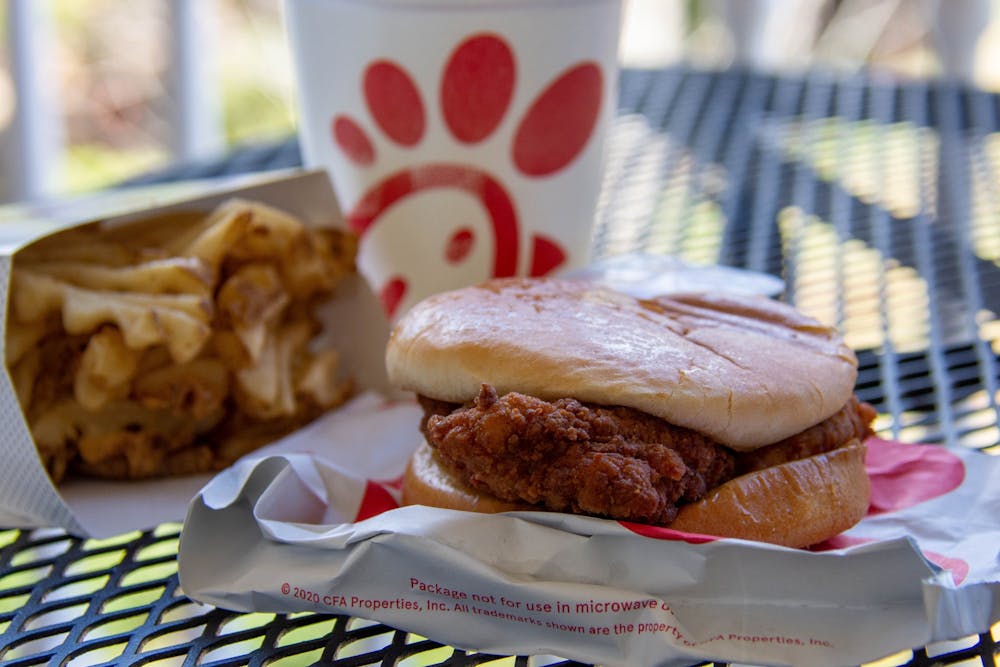Chick-fil-A, McDonald’s, Raising Canes and Cook Out all have one thing in common — their popularly-known, conveniently cheap, greasy yet sought-after menu items. Whether it be the Original Chicken Sandwich, Big Mac, chicken finger meal or Cook Out tray, customers flock toward these fast food establishments to throw money in their direction. And though a majority of Americans consume animal products, they fail to hold the questionable internal operations of the meat industry accountable. Not only do the practices of the meat industry negatively affect one’s health, but they contribute to global warming and raise serious ethical concerns of inhumane animal treatment. The meat industry must be reformed in order to turn toward more ethical and sustainable practices.
Meat consumption is not a new occurrence — the practice of butchering animals dates back to first-century AD and can even be found in the Bible. Likewise, food similar to the modern-day hamburger appears in a Roman cookbook as a “minced meat patty blended with crushed nuts.” Since then, animal products — specifically their meat — have remained at the forefront of the American diet. Despite its prominence as a core part of many Americans’ diets, there are fatal health concerns attached to the consumption of processed meat. The National Institutes of Health and the American Association of Retired Persons completed a study whose results affirm red and processed meat intakes are associated with “modest increases” in total mortality, cancer mortality and cardiovascular disease. Additionally, the use of fertilizers and pesticides to cultivate animal feed and antibiotics to increase animal growth create a plethora of negative externalities — polluting natural ecosystems, killing wildlife and inducing disease in humans. Clearly, the effects of meat consumption on our environment are detrimental — we must change our habits in order to protect future generations
It would be naive to argue that meat production must end. Rather, we must produce and consume it responsibly. While some legislative steps have been taken, they need increased enforcement to be effective. On the federal level, the U.S. Department of Agriculture must heighten enforcement of all aspects derived in Title 9 of the Code of Federal Regulations — which serves as a catch-all series of rules for meat and poultry establishments and related industries. Similarly, the Virginia Department of Agriculture and Consumer Services must fully enforce Title 9, requiring businesses that produce and sell meat to pass inspection requirements — penalizing those that don't. While established to protect the health and moral integrity of the nation, corruption still exists within these industries that hinder responsible meat production.
Smithfield Foods — the world’s largest pork processor and Virginia Athletics supporter — serves as an unfortunate example. Smithfield has a disappointing history of inhumane farming practices. In 2007, Smithfield promised to remove gestation crates — metal crates that constrict pregnant pigs so much they cannot turn around. Only two years later, they backed out of this promise. While reinstating this goal in 2017, their so-called solution still incorporates these demoralizing crates. This April, the Humane Society of the U.S. will take Smithfield to court on the basis of misrepresenting its practices to the public. It is horrific to think this company has gone unscathed for over a decade, dodging the repercussions of its malpractices. Large factory farms — like Smithfield — make up 99 percent of farmed animals. Unless federal regulations are more stringent, these producers will continue to exploit undeserving animals to no end.
As if the meat industry could not be more problematic, livestock accounts for at least 14 percent of global greenhouse gas emissions. And about 44 percent of these emissions are methane — a gas up to 100 times more destructive than carbon dioxide. As it stands, these emissions must decrease to meet the goals of the Paris agreement — a legally binding international agreement designed to mitigate global warming. Biodiversity also faces challenges — animal products make up 83 percent of global farmland use, leaving little room for other crops. However, solutions exist for producers and consumers. Though facing opposition in the past, cap and trade programs can be implemented for meat companies to limit emissions. Also, consumers can opt for plant-based alternatives to meat products to lessen demand and consequently supply.
Whether you see animals as friends or food, it is an undeniable fact that they are sentient beings. The very label of meat — while seemingly harmless — confines animals to their skin and bone. It transforms their emotion and suffering into nothingness. It dismisses their very aliveness — already considering them dead — and portrays them as objects subject to our control. To senselessly cage and slaughter them without so much as a lick of emotion is cruel and heartless. Personal opinions of meat consumption aside, its industry is cause for ethical, environmental and health concerns. These companies must do better — but ultimately, society must reject such actions. Blindly supporting these establishments only deepens their incentive to pollute our moral and environmental integrity.
Grace Duregger is an Opinion Columnist for The Cavalier Daily. She can be reached at opinion@cavalierdaily.com.
The opinions expressed in this column are not necessarily those of The Cavalier Daily. Columns represent the views of the authors alone.







